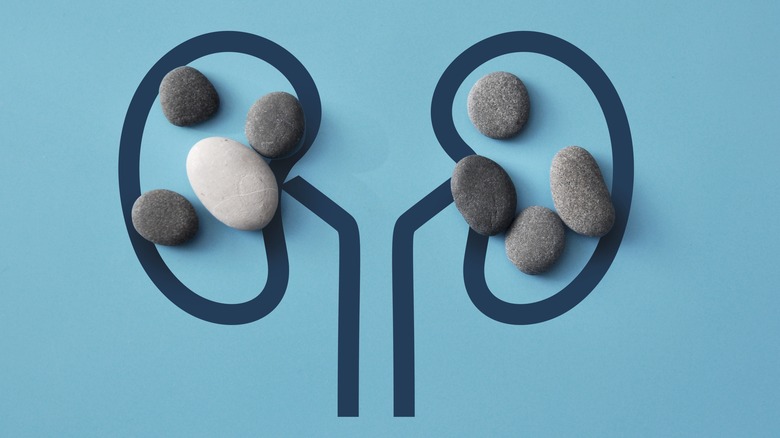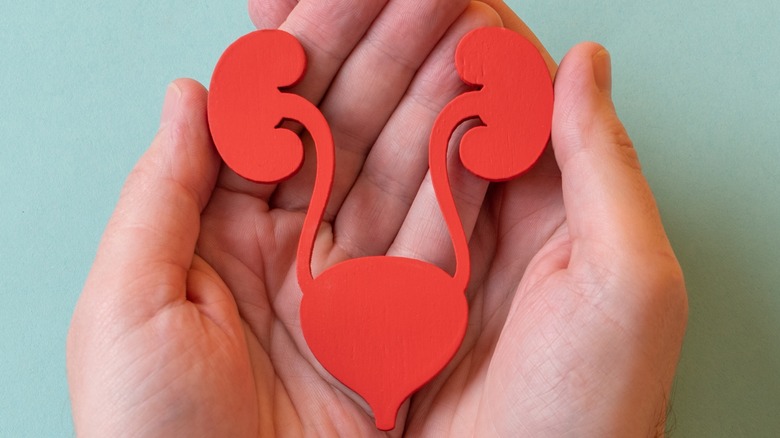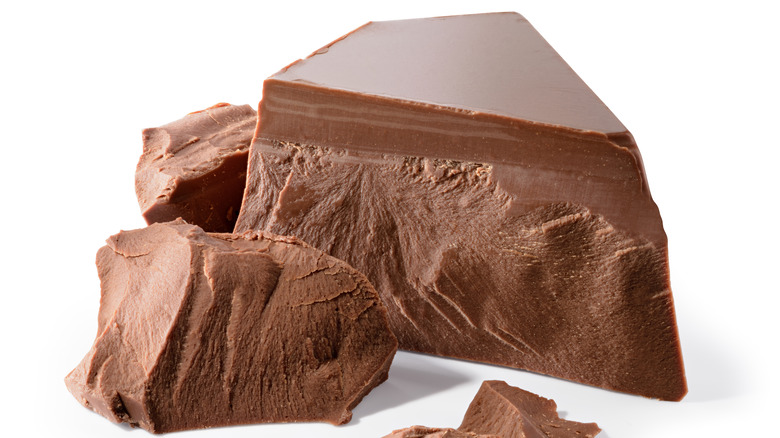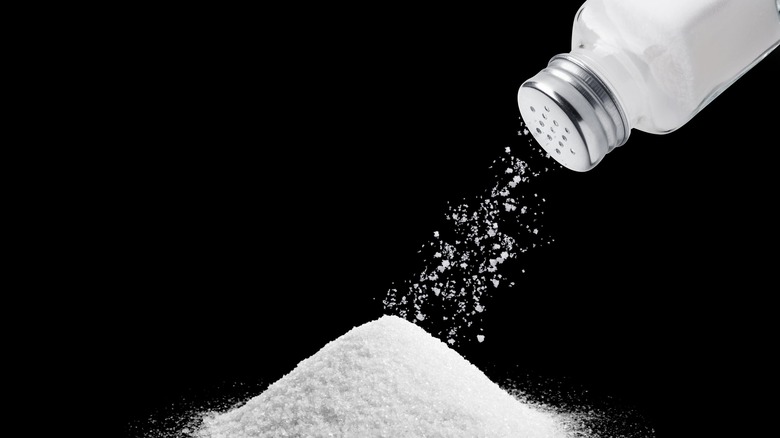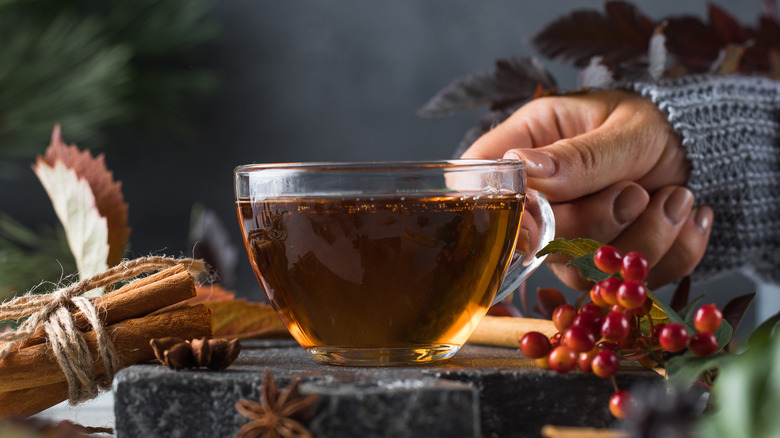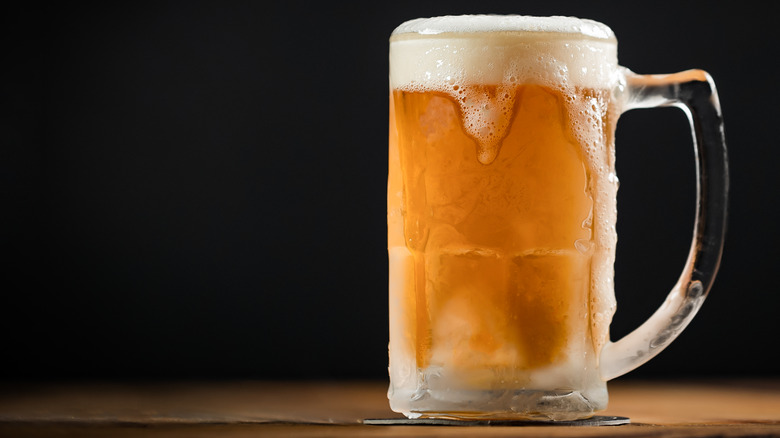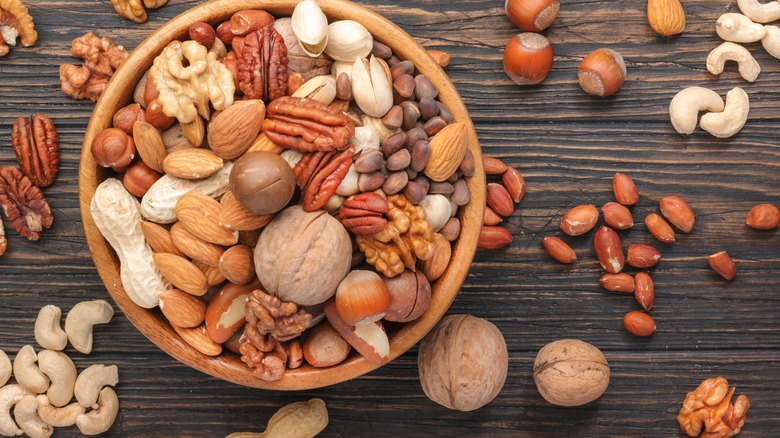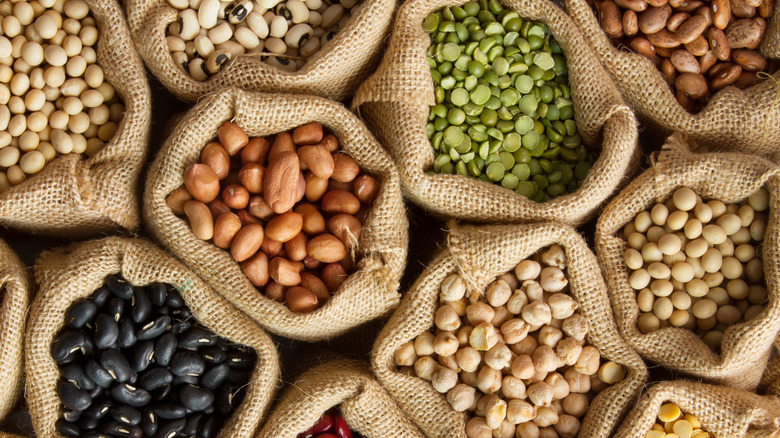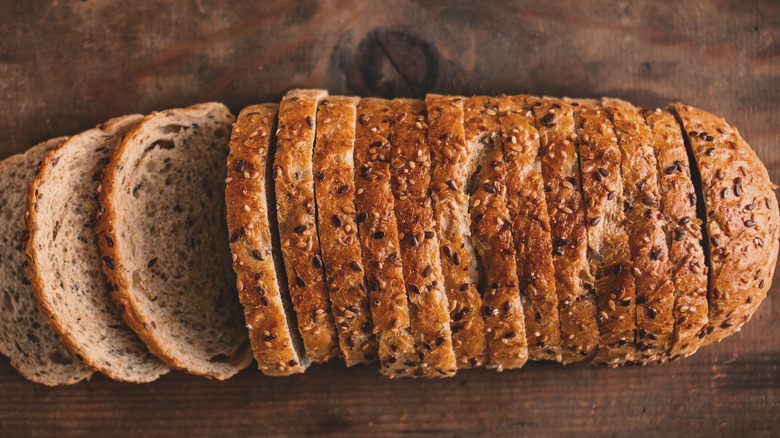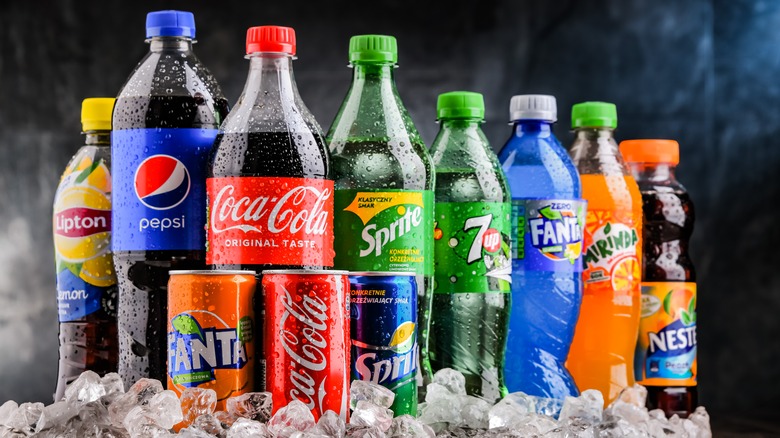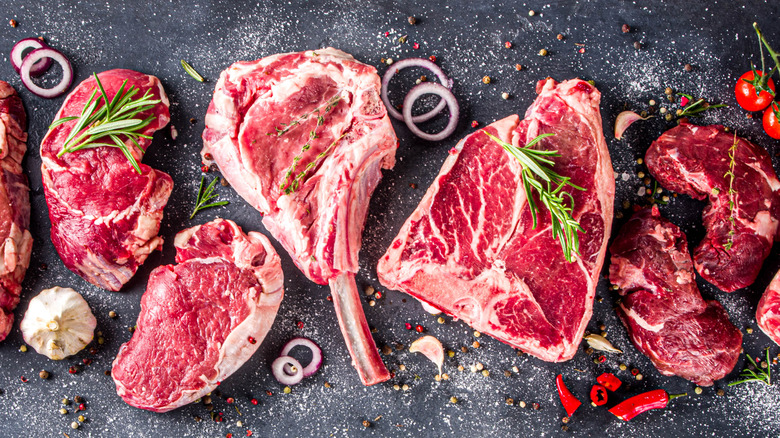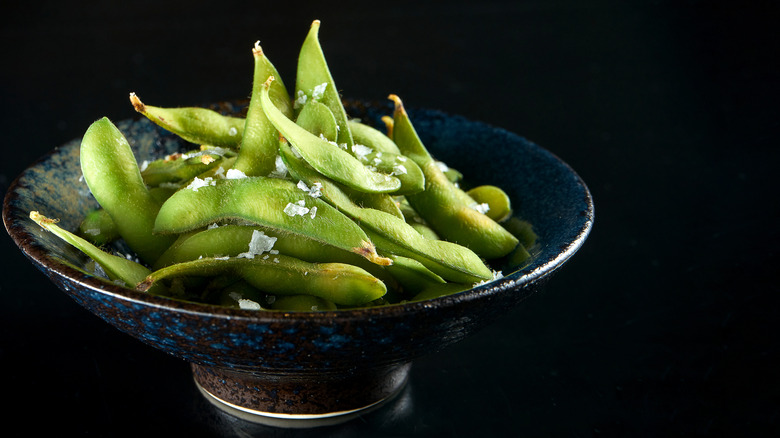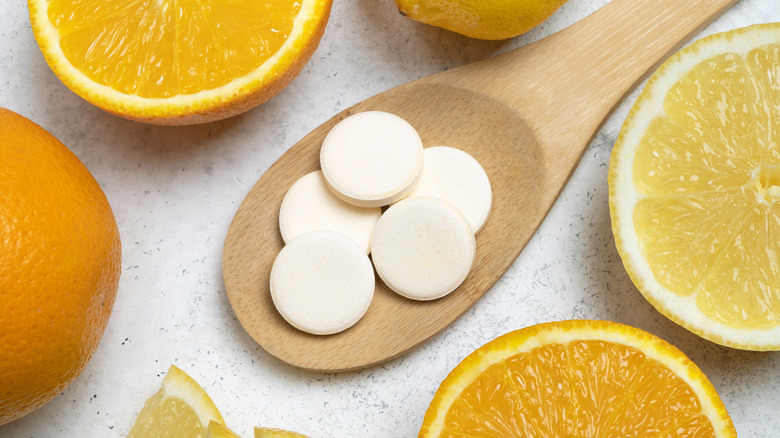Foods That Could Cause Kidney Stones
If you are one of the approximately 9% of adults in the U.S. who has had a kidney stone, you are probably well aware of how painful it is (via European Urology). According to the National Institute of Diabetes and Digestive and Kidney Diseases (NIDDK), kidney stones are hard pieces of material that form in your kidneys and pass through your urinary tract. Your kidneys act as your body's filtration system — they get rid of toxins and excess minerals through your urine (per Kidney Research UK). However, certain materials that your kidneys need to filter out can sometimes form crystals that in turn can gather together and form small stones (per Johns Hopkins Medicine). Some common symptoms of kidney stones include sharp pain in your back, side, lower abdomen, or groin (per NIDDK). Other symptoms can be difficulty urinating or constant need to urinate, cloudy or bad-smelling urine, or bloody urine.
Not all kidney stones are the same. The NIDDK explains the four main types. Calcium stones are the most common, and they are made from calcium and either oxalate or phosphorus. Uric acid stones are the second most common – uric acid results when your body breaks down purines, substances that are naturally found in your body as well as in some foods. Struvite stones — consisting of magnesium, ammonium, phosphate, and calcium — are rare. Cystine stones are also rare and only form if you inherited the rare disorder cystinuria, which causes high cystine levels in the urine. The foods you may want to avoid would therefore depend on the type of kidney stones you have had, but we've rounded up a list of some of the common culprits that might contribute to these uncomfortable deposits.
High oxalate foods
According to The Kidney Dietitian, about 77% of all kidney stones are calcium oxalate stones. So, you might naturally think that reducing calcium intake is the way to avoid these stones. However, experts recommend consuming plenty of calcium and state that it is actually oxalate that you want to avoid. Johns Hopkins Medicine reports that there is no evidence that reducing calcium reduces kidney stones. Indeed, a review article in Clinical Nutrition Research explains that the reason calcium oxalate stones form is due to higher amounts of oxalate. Calcium binds to oxalate and pulls it out of the body. Therefore, you want to consume enough calcium to remove the oxalate you take in. Otherwise, your body absorbs more oxalate, and as a result, stones can form that your kidneys need to get rid of. Case in point, one study in The Journal of Urology found that the risk of kidney stones was significantly decreased with higher calcium consumption.
Urologist Dr. Smita De with the Cleveland Clinic says that any problems from "too much" calcium tend to come from supplements, because they can drastically raise calcium levels in the body. Dr. De recommends being cautious with these supplements and consulting with your doctor before taking them, and ideally getting most of your calcium from food sources. According to the Medical College of Wisconsin (MCW), to have enough calcium in your diet, you can eat butter, cheese, margarine, and milk, because they either have no oxalate or minimal amounts of it. According to the National Health Service (NHS), you also want to drink plenty of fluids to reduce oxalate concentrations in your urine. However, some foods to avoid that contain some of the highest concentrations of oxalate are beets, rhubarb, spinach, parsley, peanuts, animal protein, and soybean.
Chocolate
This one may be a bit painful to read: Yes, according to Harvard Health Publishing, chocolate is a food that contains high concentrations of oxalate, and eating it thus increases the chances for calcium oxalate kidney stones. That said, the MCW states that the goal of the low-oxalate diet is to avoid a very high concentration of oxalate in the urine. One way to combat this and to still enjoy high oxalate foods is to eat small amounts of them at different points throughout the entire day, rather than consuming a large quantity at once. So, having a few small pieces of chocolate over the course of your day may be much safer than eating a couple of brownies in one sitting.
If even that approach cannot satisfy your sweet tooth, there are an abundance of dessert options that do not include chocolate. Low-oxalate dessert options from The Kidney Dietician include vanilla ice cream, apple crisp, oatmeal cookies, and butterscotch pudding.
Sodium-rich foods
According to an article in the journal Nephrology Dialysis Transplantation, higher sodium intake increases the risk for calcium phosphate and uric acid kidney stones. To help prevent kidney stones, Harvard Medical School recommends limiting your daily intake of sodium to 1,500 milligrams per day — which is only two-thirds of a teaspoon of salt! And note that sea salt is no better than regular table salt, says the University of California San Francisco (UCSF).
Furthermore, it is not just foods that taste salty you might want to avoid. You might be surprised by some of the foods that contain lots of sodium, such as pancake and waffle mixes, canned vegetables, pasta sauces, and instant pudding. Some breakfast cereals — which you probably think of as being sweet — can also contain high levels of sodium (via MyFoodData). And what's more, Time reports that foods such as muffins, tortillas, and even donuts have a lot of added salt.
UCSF shares numerous ways in which you can reduce your sodium intake. One is to read food labels and purchase items with 140 milligrams of sodium or less per serving. You can also use lemon, pepper, and other spices to season food rather than salt. A third way is to cook more at home, as foods made from scratch tend to have less sodium than instant foods or pre-made mixes, and restaurants use much more sodium than you might realize to make their meals more appetizing (per Time).
Caffeinated beverages
As noted by a review in Advances in Nutrition, research on the relationship between caffeine consumption and kidney stones has yielded conflicting results. On the one hand, coffee and tea have significant amounts of oxalate. On the other hand, they are fluids that help flush out your system and prevent kidney stones. However, what has been found consistently in the literature is that decaffeinated coffee is associated with a lower risk for kidney stones. So you might want to start your day with a decaf cup of Joe.
Black tea might increase the risk for calcium oxalate stones if you have six or more cups per day, according to an article in the Asia Pacific Journal of Clinical Nutrition. In addition, one study in the Journal of Food Composition and Analysis found that green tea has about the same amount of oxalate as black tea. Herbal and iced teas were found to have a much lower oxalate concentration, alongside other caffeinated drinks like sodas and sports drinks.
Alcoholic beverages
If you tend to get uric acid stones, The Kidney Dietician and the National Kidney Foundation recommend limiting your consumption of beer and other alcohol. They do not quantify what they mean by limiting your intake, however. The Dietary Guidelines for Americans defines moderate drinking as two drinks or less per day for men and one drink or less per day for women, according to the Centers for Disease Control and Prevention (CDC). The main problem with some alcoholic beverages is that they contain purines (per The Kidney Dietitian). These naturally occurring chemicals cause uric acid to be released in the body when they are broken down — and excess uric acid that accumulates in the body can form crystals and kidney stones (via Cleveland Clinic).
In terms of oxalate, the MCW reports that alcoholic drinks like wine and lager can have small amounts. However, the University of Michigan Health System (UMHS) states that dark beer is high in oxalate. So if you get calcium oxalate stones, you may want to avoid darker beers in favorite of other beverage options.
Nuts and seeds
Some nuts, nut butters, and seeds tend to be high in oxalate which can lead to calcium oxalate stones, according to the NIDDK. The Kidney Dietician reports that those highest in oxalate are Brazil nuts, cashews, hazelnuts, pine nuts, chia seeds, and sesame seeds. In addition, the site notes that not only are almonds high in oxalate, but so are products derived from them, such as almond butter, flour, and milk.
However, there are a number of other nuts and seeds you can enjoy that have lower concentrations of oxalate. These include macadamia nuts, pecans, pistachios, and walnuts. Some seeds that have lower levels of oxalate are sunflower seeds, pumpkin seeds, and flax seeds. If you like to snack on nuts but have a history of calcium oxalate stones, low oxalate beans can make great snacks. Dried peas, or roasted and seasoned chickpeas can provide the perfect afternoon crunch.
Legumes
Legumes make up the one of the largest families of flowering plants. Harvard T.H. Chan School of Public Health explains that the parts of legumes that we eat — the edible seeds — are actually called pulses. Beans are just one type of pulse. And peanuts are, in fact, another type of pulse, not a nut (via a review in the Journal of Medicinal Food).
According to Medline Plus, you might want to avoid legumes if you have a history of uric acid stones. This could be because they contain purines that can increase uric acid in your body, according to a review in the journal Nutrients. Specific legumes you may want to avoid due to their higher purine content include lentils, black-eyed peas, and great northern beans, according to SFGate. Additionally, those looking to cut down on oxalates will want to avoid peanuts, according to the NIDDK.
If you are vegetarian, you likely eat legumes because they are a good source of protein (via Cleveland Clinic). However, if you are trying to avoid kidney stones, dairy is also a good source of protein that you can have instead (per the U.S. Department of Agriculture). If you are vegan, The Kidney Dietician suggests substituting cow's milk with oat or rice milk fortified with calcium. Indeed, 1 cup of oat milk has 3 grams of protein (via USDA).
Starches
You don't need to avoid all types of starches to stave off kidney stones, and it's vital that you take in enough carbohydrates for energy. However, there are some that are particularly high in oxalate and thus can cause calcium oxalate stones. University of Michigan Health System (UMHS) recommends avoiding bran or high-fiber cereal, whole wheat, and buckwheat among others because they have high levels of oxalate.
As an alternative, you can consume in limited quantities starches that have moderate levels of oxalate. A few of the ones suggested by UMHS include brown rice, corn, spaghetti in red sauce, and white bread. If you are looking for breakfast foods to replace your bran cereal, you can enjoy bagels and oatmeal. And The Kidney Dietitian notes that oatmeal is great for people who are trying to avoid kidney stones. This is because it is high in magnesium, which can help prevent calcium oxalate stones, as shown in a study in Biological Trace Element Research.
Sugary food and drinks
Some researchers think that one sugar in particular, fructose, can release higher levels of oxalate and uric acid in your body (via Nutrients). A small study in BMC Nephrology actually found that fructose consumption was associated with increased levels of uric acid and oxalate. Another study of over 2700 individuals in Taiwan found that high levels of high-fructose corn syrup were associated with an increase in uric acid (per International Journal of Obesity). And high-fructose corn syrup is more than 40% of sweeteners that are added to foods and drinks (via Cleveland Clinic). If you have a history of uric acid or calcium oxalate stones, The Kidney Dietician recommends limiting how much you consume drinks like regular soda, fruit juice, sweet tea, lemonade with sugar, and energy drinks. She says these are particularly bad for kidney stones because of the high amounts of added fructose.
Added sugar also exists in desserts, pastries, candy, and cookies (per FamilyDoctor). If you have a sweet tooth, you might try lower-sugar candy shared in New York Magazine that can be just as satisfying. When baking, you can use sugar substitutes instead of sugar, and even add them to unsweetened iced tea or lemonade. Sugar substitutes such as Equal and Sweet 'N Low are FDA-approved and research has found them to be safe (per FamilyDoctor).
Animal protein
While having enough protein in your diet is important, too much animal protein can increase your risk for kidney stones, according to a review in Nutrients. And some data shows that most of the protein Americans consume is animal protein — 67% of protein intake in the U.S. is from animal sources, with 33% coming from plant-based protein (via Current Developments in Nutrition).
If you have a history of uric acid stones, you want to consume smaller portions of animal protein. This is because acid is a byproduct when your body metabolizes this kind of protein, according to The Kidney Dietician, and more acid in your body means a higher chance of uric acid kidney stones. In particular, you want to limit foods such as red meat, processed meats, poultry, and organ meats. She recommends having no more than 6 ounces of these meats per day. And one organ meat in particular packs a double whammy of things you want to avoid: In addition to delivering animal protein, liver also has moderate amounts of oxalate according to University of Michigan Health System, so you might want to curb the liver and onions for dinner.
Soybean
According to the MCW, soybeans and soybean products can contain high levels of oxalate. One study in the Journal of Agricultural and Food Chemistry found that among products derived from soy, soy nuts, soy flour, tempeh, and soynut butter had the highest oxalate concentrations. Soybeans (edamame) and textured soy (vegetable) protein were also high in oxalate. This can be disappointing if you enjoy snacking on edamame or soy nuts, or if you are vegetarian or vegan and thus consume textured vegetable protein.
The good news is that the study also found soy sauce and all types of tofu to be low in oxalate, meaning you can turn to tofu as a protein source if you are trying to reduce your meat consumption. And according to WebMD, tofu has abundant health benefits and can help with concerns such as hot flashes, cholesterol levels, and osteoporosis. Luckily, there are many delicious ways to prepare tofu such as in stir fry, Thai curry, and miso soup (via Greatist).
Vitamin C supplements
Vitamin C has been thought to cause kidney stones because it could increase the oxalate in your urine (via Nebraska Medicine). However, dietary vitamin C does not appear to be a risk factor for kidney stones, according to one study in the American Journal of Kidney Diseases. With regard to vitamin C supplements and kidney stone risk, the research yields mixed results. One study in Antioxidants found that intravenous vitamin C was not associated with kidney stones. However, an 11-year-long study in JAMA Internal Medicine found that men who took high-dose vitamin C supplements were twice as likely to get kidney stones. If you are taking or thinking about taking dietary supplements in general, the Dayton Daily News notes it is important to tell your doctor. They can help you to avoid potentially harmful interactions with medication or other potential health problems that can be caused by supplementation.
According to the NHS, you likely do not need to take vitamin supplements if you consume a balanced diet. Fruits and vegetables like strawberries, broccoli, red pepper, or an orange should give you the vitamin C you need (via Mayo Clinic). Further, The Kidney Dietitian notes that eating fruit also ups your potassium intake, which might also reduce the risk of kidney stones.

